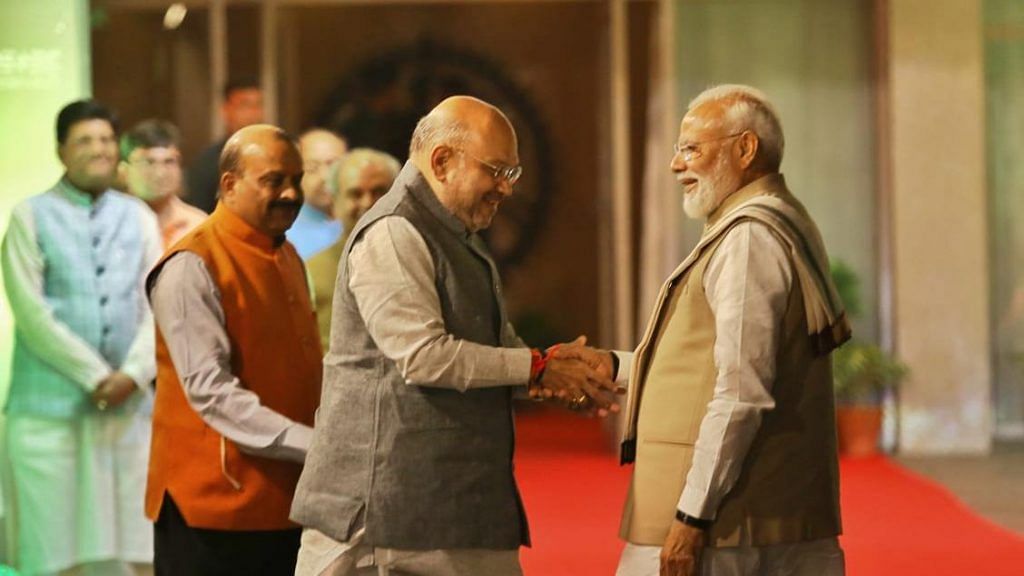The disturbing scenes from the protests in Delhi’s Jamia Millia Islamia University Sunday have had an unintended consequence — of taking away the focus from Assam and the northeast, a region that has been on the boil since the new Citizenship Act was passed, reopening old ethnic fault lines and conflicts.
But what the protests in Jamia, as well as in Uttar Pradesh’s Aligarh Muslim University (AMU) and elsewhere in the country have also done is change an ethnic-non ethnic conflict — which is the primary sentiment in Assam — into the more relatable, attention-grabbing Hindu-Muslim binary. Incidentally, this binary suits Prime Minister Narendra Modi and Home Minister Amit Shah’s Bharatiya Janata Party (BJP), and helps it wriggle out of the more complex issue in the northeast.
The Hindu versus Muslim line plays right into the BJP’s majoritarian and divisive brand of politics and is much easier to explain to its core voters. All Modi-Shah need to do is claim that because the law tries to help ‘persecuted’ Hindus from neighbouring countries, Muslims in India, ‘pro-Muslim’ political parties as well as ‘anti-national elements’ are against it. Modi already hinted at what the protesters are wearing (a dog-whistle to the Muslim students of Jamia) – this is the politics the BJP knows how to cunningly exploit and win with.
As the Lok Sabha and the Rajya Sabha passed the contentious bill in quick succession last week, Assam – or at least parts of it – went up in flames. The flames were both literal and metaphorical, with the Citizenship Amendment Act (CAA) coming soon after the National Register of Citizens (NRC) in Assam — thus reigniting the old ethnic Assamese versus ‘bidexi‘ (outsider) ire.
Also read: ‘Alone on my floor’ — Jamia students leave hostels after violent clash with Delhi Police
Assam forgotten, over to the ‘mainstream’
The exercise to update the NRC in Assam caught national attention, but largely because the state’s ruling BJP government as well as the party’s central leadership overtly communalised what was meant to be a socio-ethnic exercise.
Not many outside the northeast could, or perhaps even bothered to, grasp why this process was tricky and what its context and history was. Assam’s opposition to the Citizenship Amendment Bill (CAB), therefore, remained even more inscrutable to the rest of India.
However, the burning images from Assam and other northeastern states like Tripura finally brought some attention to why the indigenous people of this region were so vehemently opposed to granting citizenship to non-Muslim refugees, primarily from Bangladesh, who had settled there.
Days later, however, the situation in Assam is relatively calm with internet clampdowns and curfews, the visuals are less startling, northeast is promptly being forgotten, and Delhi and other campuses have ensured all attention turns towards them.
In Assam too, it was students and organisations like the All Assam Students Union (AASU) who were at the forefront of the protests; however, even the support they found outside the region came only from those belonging to the northeast.
Because no one outside Assam quite cares about why the state is protesting. No one in the rest of the country really wants to know what lies beneath this seemingly quiet surface, and how dangerously has the potent combination of NRC-CAA brought back old grudges.
Also read: Pushed to the edge, young Indian Muslims are asked to not react
The more convenient binary
Those who have jumped onto the anti-Citizenship Act bandwagon are essentially opposing the fact that the illiberal law leaves out Muslim refugees. They also fear this legislation can be used against India’s Muslims. With the police using brute force against students of Jamia and AMU, protesters have found another (valid) reason to be up in arms.
Conveniently forgotten in these protests is why Assam and the northeast need attention, why it is imperative to understand their concerns, and how it is only the northeast region that will be really impacted by the new law.
With the NRC done and 19 lakh people in Assam being declared illegal immigrants, the new law means Hindus left out will be eligible for citizenship — a move that goes against the very grain of the 1979-85 Assam movement, the Assam Accord as well as the popular sentiment of its people.
For the Assamese, the battle has been against the ‘outsider’ — irrespective of religion. It has been an ethnic, linguistic conflict — where Bengalis, Marwaris and Biharis were all seen as ‘undesirable elements’ from outside.
Today, the northeast is opposing the Citizenship Amendment Act because it does not want any ‘illegal’ immigrant to get legal permission to live in the region, while those outside are against it because they feel it is discriminatory toward Muslims. There is a clear contradiction in these approaches, and for the ‘secular’, ‘liberal’ basher of the Citizenship Act, Assam’s rather parochial opposition is both uncomfortable and not worth fighting for.
Northeast’s ethnic-non ethnic fight against the new citizenship rules is barely engaging and does not fit into the larger narrative, while the Hindu-Muslim binary is far more impactful, national and politically loaded.
This is also a narrative that suits the BJP well. Dealing with the complex layers and context of Assam’s problems with the CAA is far more challenging for the BJP, especially with respect to its position in the region.
This was Assam and northeast’s moment, and the region expected the rest of the country to weigh in on its narrative and conflict, instead of starting its own version that would put the former on the back burner.
Much of the northeast’s past resentment has been this feeling of being relegated to the ‘periphery’, with the ‘mainstream’ refusing to acknowledge its concerns and being all-consumed with its own problems. With the anti-Citizenship Act protests snowballing across India, while Assam is slowly forgotten, it isn’t just the BJP that is pushing the region back into its old, dark days of feeling alienated and agitated.
